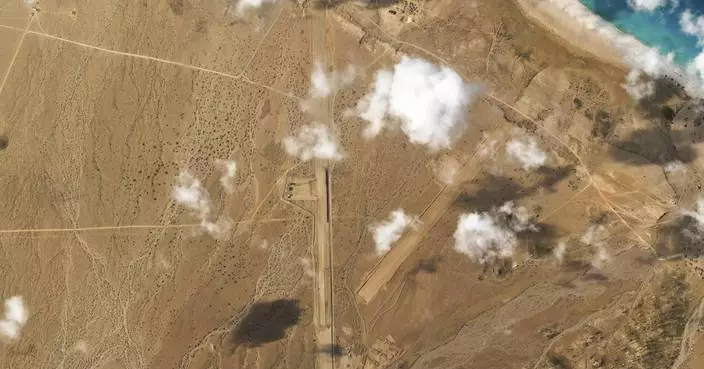The U.S. ambassador to Yemen on Thursday urged Iran-backed rebels in the war-torn country to show "political maturity" and live up to their responsibilities under a U.N.-negotiated peace deal for the port city of Hodeida, Yemen's key gateway for international aid.
The remarks by U.S. Ambassador Matthew Tueller came a day after the spokesman for Yemen's internationally recognized government called for stepped-up international pressure on the rebels, known as Houthis, who have refused to surrender Hodeida.
Speaking in the southern city of Aden, which has been serving as the seat of Yemen's government since the rebels in 2014 seized the capital of Sanaa, Tueller asked the Houthis to stop serving the interests of those who want to further "weaken" Yemen — a veiled reference to Iran.
In March 2015, a Saudi-led coalition of mainly Arab states joined the war on the side of the Yemeni government and has been fighting the Houthis since. The conflict, mostly stalemated at this point, has spawned the worst humanitarian crisis in the world today.
The last round of peace talks in Sweden late last year offered a glimpse of hope after the warring sides agreed to withdraw their forces from Hodeida. They remained, however, divided over who will run the key port once they pull out. The U.N.-brokered deal was vague, saying a "local force" would take over without specifying who would lead it.
Tueller said he is hoping "to see if the Houthis can demonstrate political maturity" and urged them to stop serving Iran's agenda and instead "start to serve the interest of the Yemeni people."
The U.S. provides billions of dollars of arms to the Saudi-led coalition and rights groups have documented the killings of thousands of civilians in coalition airstrikes. U.S. military advisers are also helping coalition commanders in intelligence gathering.
Tueller ruled out the possibility of moving the U.S. Embassy to Aden, saying it would give the impression that Washington could back a divided Yemen.
"Our hope is that we will reopen the embassy in Sanaa, the capital," he said.
On Wednesday, Rageh Badi, the Yemeni government spokesman, denounced remarks by senior rebel leader Mohammed Ali al-Houthi who earlier this week told The Associated Press that a rebel withdrawal from Hodeida would be "impossible."
Badi said such remarks could set off new fighting in Hodeida and violate the tentative peace agreement reached by the two sides in Sweden late last year.
The remarks are a "renunciation of the Hodeida agreement and a declaration of war," Badi said, urging the U.N. to prevent another "explosion of the situation" in Hodeida. The government fears the Houthis are using the current Hodeida cease-fire to dig in and plant land mines ahead of another round of fighting, he said.
Renewed all-out war in Hodeida would risk severing the main passage for humanitarian aid to the rest of the country, including northern Yemen, a Houthi heartland.
That coffee you slurped this morning? It’s 600,000 years old.
Using genes from coffee plants around the world, researchers built a family tree for the world's most popular type of coffee, known to scientists as Coffea arabica and to coffee lovers simply as “arabica.”
The researchers, hoping to learn more about the plants to better protect them from pests and climate change, found that the species emerged around 600,000 years ago through natural crossbreeding of two other coffee species.
“In other words, prior to any intervention from man,” said Victor Albert, a biologist at the University at Buffalo who co-led the study.
These wild coffee plants originated in Ethiopia but are thought to have been first roasted and brewed primarily in Yemen starting in the 1400s. In the 1600s, Indian monk Baba Budan is fabled to have smuggled seven raw coffee beans back to his homeland from Yemen, laying the foundation for coffee’s global takeover.
Arabica coffee, prized for its smooth and relatively sweet flavor, now makes up 60% - 70% of the global coffee market and is brewed by brands such as Starbucks, Tim Horton's and Dunkin'. The rest is robusta, a stronger and more bitter coffee made from one of arabica's parents, Coffea canephora.
To piece together arabica coffee’s past, researchers studied genomes of C. canephora, another parent called Coffea eugenioides, and more than 30 different arabica plants, including a sample from the 1700s — courtesy of the Natural History Museum in London — that Swedish naturalist Carl Linnaeus used to name the plant.
The study was published Monday in the journal Nature Genetics. Researchers from Nestlé, which owns several coffee brands, contributed to the study.
The arabica plant’s population fluctuated over thousands of years before humans began cultivating it, flourishing during warm, wet periods and suffering through dry ones. These lean times created so-called population bottlenecks, when only a small number of genetically similar plants survived.
Today, that renders arabica coffee plants more vulnerable to diseases like coffee leaf rust, which cause billions of dollars in losses every year. The researchers explored the makeup of one arabica variety that is resistant to coffee leaf rust, highlighting sections of its genetic code that could help protect the plant.
The study clarifies how arabica came to be and spotlights clues that could help safeguard the crop, said Fabian Echeverria, an adviser for the Center for Coffee Research and Education at Texas A&M University who was not involved with the research.
Exploring arabica’s past and present could yield insight into keeping coffee plants healthy – and coffee cups full – for future early mornings.
The Associated Press Health and Science Department receives support from the Howard Hughes Medical Institute’s Science and Educational Media Group. The AP is solely responsible for all content.

FILE - Mohammed Fita picks coffee beans on his farm Choche, near Jimma, 375 kilometers (234 miles) southwest of Addis Ababa, Ethiopia, on Saturday, Sept. 21 2002. Wild coffee plants originated in Ethiopia but are thought to have been primarily roasted and brewed in Yemen starting in the 1400s. (AP Photo/Sayyid Azim, File)

FILE - Arabica coffee beans harvested the previous year are stored at a coffee plantation in Ciudad Vieja, Guatemala, on May 22, 2014. In a study published in the journal Nature Genetics on Monday, April 15, 2024, researchers estimate that Coffea arabica came to be from natural crossbreeding of two other coffee species over 600,000 years ago. (AP Photo/Moises Castillo, File)





